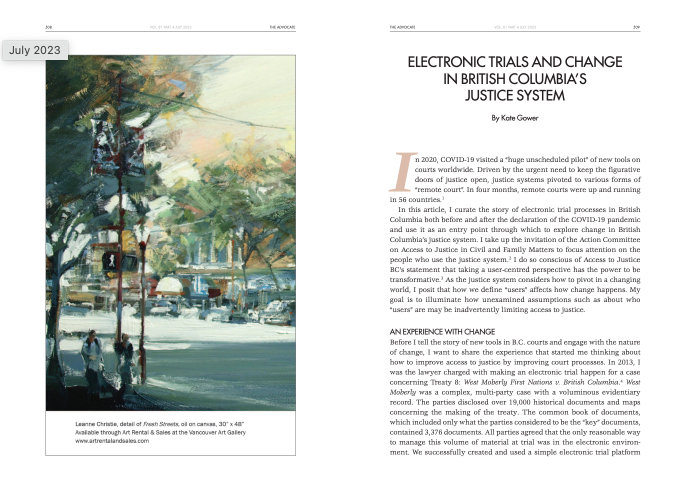
Electronic Trials and Change is the subject of my article in BC’s Advocate magazine. Blogging Tip: this sentence mirrors the title because search engine optimization runs best that way.

In the article, I curate the story of electronic trial processes in British Columbia both before and after the declaration of the COVID-19 pandemic. I use it as an entry point through which to explore change in British Columbia’s justice system.
Twenty-five years ago, John Kotter identified eight steps to creating successful change. Kotter’s first step is establishing a sense of urgency. COVID-19 created that in the justice system. I have some fun exploring BC’s experience with change against a backdrop of changes at courts in Ontario and the United Kingdom.
I consider how decisions about “users” affect how change happens. My conclusion is that the unexamined construction of the “user” is causing the BC justice system to miss opportunities for change.
Three Questions
My questions about Electronic Trials and Change are:
- Who is the “user” in this change scenario? If the user is more than the judiciary, how could we—or should we—construct the “users” of the system as change happens in our courts?
- What are the assumptions embedded in the recent changes? Are we overestimating the ability of legally trained users to follow detailed notices? Are we overestimating the utility of written manuals?
- How can we best gather and assess information on users’ experiences with the new tools here in British Columbia?
A big thank you to the Advocate for publishing my article. Special thanks to Michael Bain who works tirelessly to corral all the writers and produce each edition. I am also grateful of the support and guidance of my LLM Thesis supervisors at the University of Victoria: Professor Emeritus Jeremy Webber and Professor Robert Lapper, KC.
I welcome your answers, comments and thoughts!

